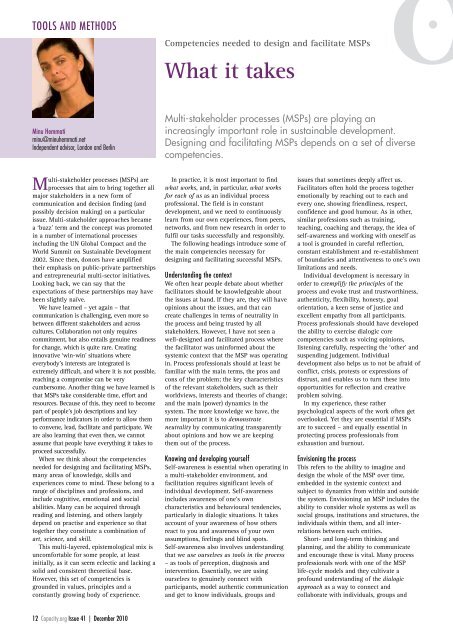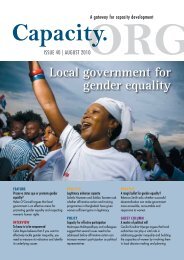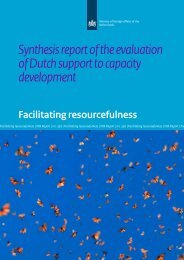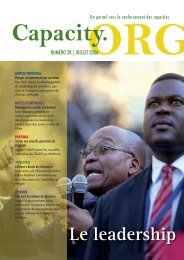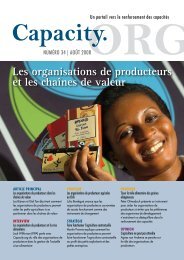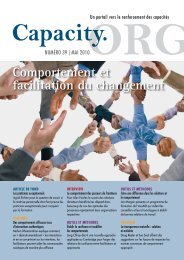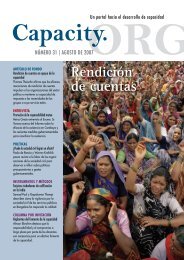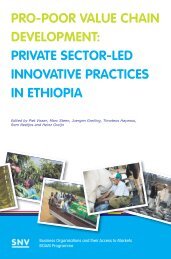Facilitating multi-actor change - Capacity.org
Facilitating multi-actor change - Capacity.org
Facilitating multi-actor change - Capacity.org
Create successful ePaper yourself
Turn your PDF publications into a flip-book with our unique Google optimized e-Paper software.
tools and methodsCompetencies needed to design and facilitate MSPsWhat it takesMinu Hemmatiminu@minuhemmati.netIndependent advisor, London and BerlinMulti-stakeholder processes (MSPs) are playing anincreasingly important role in sustainable development.Designing and facilitating MSPs depends on a set of diversecompetencies.Multi-stakeholder processes (MSPs) areprocesses that aim to bring together allmajor stakeholders in a new form ofcommunication and decision finding (andpossibly decision making) on a particularissue. Multi-stakeholder approaches becamea ‘buzz’ term and the concept was promotedin a number of international processesincluding the UN Global Compact and theWorld Summit on Sustainable Development2002. Since then, donors have amplifiedtheir emphasis on public-private partnershipsand entrepreneurial <strong>multi</strong>-sector initiatives.Looking back, we can say that theexpectations of these partnerships may havebeen slightly naïve.We have learned – yet again – thatcommunication is challenging, even more sobetween different stakeholders and acrosscultures. Collaboration not only requirescommitment, but also entails genuine readinessfor <strong>change</strong>, which is quite rare. Creatinginnovative ‘win-win’ situations whereeverybody’s interests are integrated isextremely difficult, and where it is not possible,reaching a compromise can be verycumbersome. Another thing we have learned isthat MSPs take considerable time, effort andresources. Because of this, they need to becomepart of people’s job descriptions and keyperformance indicators in order to allow themto convene, lead, facilitate and participate. Weare also learning that even then, we cannotassume that people have everything it takes toproceed successfully.When we think about the competenciesneeded for designing and facilitating MSPs,many areas of knowledge, skills andexperiences come to mind. These belong to arange of disciplines and professions, andinclude cognitive, emotional and socialabilities. Many can be acquired throughreading and listening, and others largelydepend on practise and experience so thattogether they constitute a combination ofart, science, and skill.This <strong>multi</strong>-layered, epistemological mix isuncomfortable for some people, at leastinitially, as it can seem eclectic and lacking asolid and consistent theoretical base.However, this set of competencies isgrounded in values, principles and aconstantly growing body of experience.In practice, it is most important to findwhat works, and, in particular, what worksfor each of us as an individual processprofessional. The field is in constantdevelopment, and we need to continuouslylearn from our own experiences, from peers,networks, and from new research in order tofulfil our tasks successfully and responsibly.The following headings introduce some ofthe main competencies necessary fordesigning and facilitating successful MSPs.Understanding the contextWe often hear people debate about whetherfacilitators should be knowledgeable aboutthe issues at hand. If they are, they will haveopinions about the issues, and that cancreate challenges in terms of neutrality inthe process and being trusted by allstakeholders. However, I have not seen awell-designed and facilitated process wherethe facilitator was uninformed about thesystemic context that the MSP was operatingin. Process professionals should at least befamiliar with the main terms, the pros andcons of the problem; the key characteristicsof the relevant stakeholders, such as theirworldviews, interests and theories of <strong>change</strong>;and the main (power) dynamics in thesystem. The more knowledge we have, themore important it is to demonstrateneutrality by communicating transparentlyabout opinions and how we are keepingthem out of the process.Knowing and developing yourselfSelf-awareness is essential when operating ina <strong>multi</strong>-stakeholder environment, andfacilitation requires significant levels ofindividual development. Self-awarenessincludes awareness of one’s owncharacteristics and behavioural tendencies,particularly in dialogic situations. It takesaccount of your awareness of how othersreact to you and awareness of your ownassumptions, feelings and blind spots.Self-awareness also involves understandingthat we use ourselves as tools in the process– as tools of perception, diagnosis andintervention. Essentially, we are usingourselves to genuinely connect withparticipants, model authentic communicationand get to know individuals, groups andissues that sometimes deeply affect us.Facilitators often hold the process togetheremotionally by reaching out to each andevery one, showing friendliness, respect,confidence and good humour. As in other,similar professions such as training,teaching, coaching and therapy, the idea ofself-awareness and working with oneself asa tool is grounded in careful reflection,constant establishment and re-establishmentof boundaries and attentiveness to one’s ownlimitations and needs.Individual development is necessary inorder to exemplify the principles of theprocess and evoke trust and trustworthiness,authenticity, flexibility, honesty, goalorientation, a keen sense of justice andexcellent empathy from all participants.Process professionals should have developedthe ability to exercise dialogic corecompetencies such as voicing opinions,listening carefully, respecting the ‘other’ andsuspending judgement. Individualdevelopment also helps us to not be afraid ofconflict, crisis, protests or expressions ofdistrust, and enables us to turn these intoopportunities for reflection and creativeproblem solving.In my experience, these ratherpsychological aspects of the work often getoverlooked. Yet they are essential if MSPsare to succeed – and equally essential inprotecting process professionals fromexhaustion and burnout.Envisioning the processThis refers to the ability to imagine anddesign the whole of the MSP over time,embedded in the systemic context andsubject to dynamics from within and outsidethe system. Envisioning an MSP includes theability to consider whole systems as well associal groups, institutions and structures, theindividuals within them, and all interrelationsbetween such entities.Short- and long-term thinking andplanning, and the ability to communicateand encourage these is vital. Many processprofessionals work with one of the MSPlife-cycle models and they cultivate aprofound understanding of the dialogicapproach as a way to connect andcollaborate with individuals, groups and12 <strong>Capacity</strong>.<strong>org</strong> Issue 41 | December 2010


